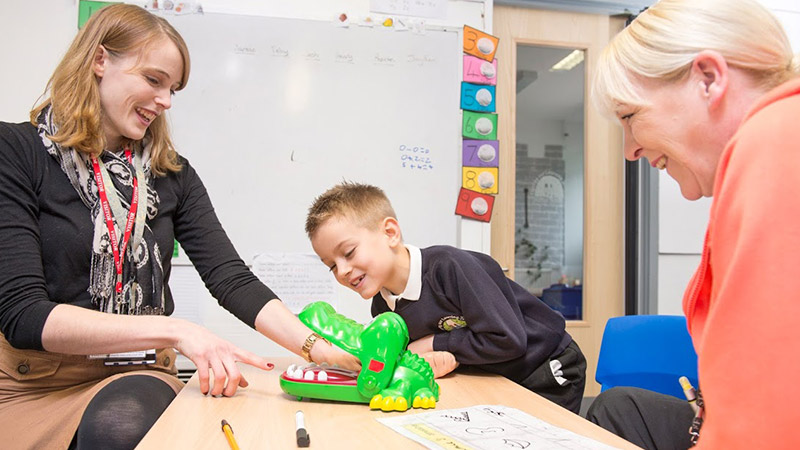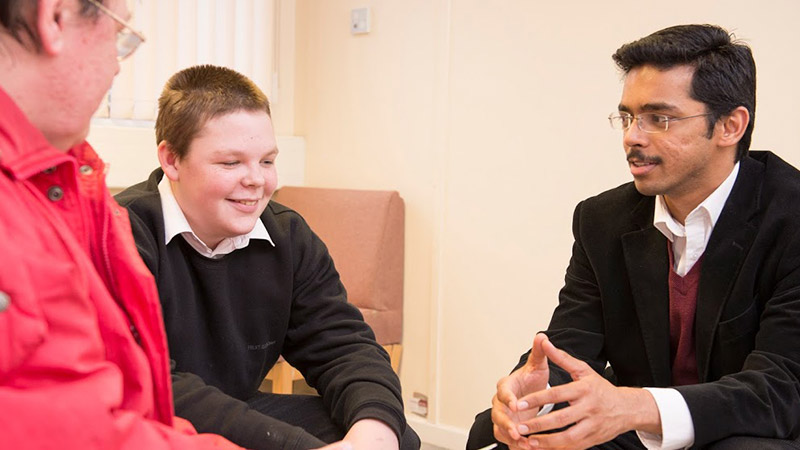Psychosocial Care of Children, Adolescents and their Families
Credit bearing module
Key facts
Course code
CHNR7004
Start dates
September 2023
Application deadline
1 September (for a September start), 1 December (for a January start).
Location
Course length
Part time: One semester
Overview
This Psychosocial Care of Children, Adolescents and their Families module opens with a focus on developing psychosocial assessment skills from a sound theoretical basis. It then moves on to explore how using your assessment of family strengths and difficulties can inform planned interventions. A range of therapeutic approaches are introduced and you are encouraged to reflect on their use within your specific practice environment.
This module will develop your understanding of the psychosocial needs that are expressed through a child’s behaviour and emotions, and your ability to identify and implement ways of managing them.

How to apply
Entry requirements
You must be working as a practitioner in a health or social care setting with babies, children or adolescents with access to families.
Terms and Conditions of Enrolment
When you accept our offer, you agree to the Terms and Conditions of Enrolment. You should therefore read those conditions before accepting the offer.
Application process
Apply through our Moodle Portal.
If you wish to take this as a standalone module then you can apply to be a postgraduate associate student using our online application portal. You will need to register for the portal prior to proceeding with an application.
Tuition fees
Questions about fees?
Contact Student Finance on:
Tuition fees
Fees quoted are for the first year only. If you are studying a course that lasts longer than one year your fees will increase each year.
How and when to pay
Tuition fee instalments for the semester are due by the Monday of week 1 of each semester. Students are not liable for full fees for that semester if they leave before week 4. If the leaving date is after week 4, full fees for the semester are payable.
- For information on payment methods, please see our Make a Payment page.
- For information about refunds, please visit our Refund policy page
Financial support and scholarships
Additional costs
Please be aware that some courses will involve some additional costs that are not covered by your fees. Specific additional costs for this course are detailed below.
Learning and assessment
This module encompasses practice in the work setting alongside a blended teaching approach will be taken for this module, delivered in units of e-learning, and seminars (a combination of synchronous or asynchronous), and experiential learning groups (ELG).
You will take turns to bring a case to the ELG. You will reflect on your work with a particular family. With guidance from the facilitator, the group will help you to make sense of your experience and of the family’s difficulties by applying the knowledge gained on the module. This builds the graduate attributes of academic literacy and critical self-awareness and personal literacy, also helping you to appreciate the relationship of these attributes to one another.
Assessed by 100% coursework.

Learning and teaching
Outline syllabus:
- psychosocial development across the lifespan, including cultural and historical context
- understanding family dynamics and generational roles: applying structural interventions.
- attachment in infancy, childhood and adulthood including trans-generational patterns
- assessment and Interventions from a psychodynamic perspective including containment
- understanding child and adolescent problems and disorders in the context of the family
- behavioural assessment and intervention including positive parenting and managing challenging behaviour
- cognitive behavioural approaches and application to anxiety disorders in children and adolescents
- interventions when working with parents. Identifying and overcoming challenges.
Assessment
Assessment methods used on this course
Coursework: Case study
The aim of this case study is:
- to use theoretical understanding of psychosocial development and of family systems to assess the problems of a child within their family context
- to identify appropriate interventions, giving the rationale for these.
Programme changes:
On rare occasions we may need to make changes to our course programmes after they have been
published on the website. For more information, please visit our
changes to programmes page.
